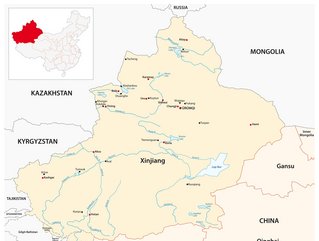Procurement & imports: the UFLPA and due diligence software

In 2016 there were 10m enslaved people, however in 2021, there were 50m enslaved people – a significant increase. Yet this spike of enslavement and human rights abuses do not coincide with consumer attitudes, says Jerry Peck, Vice President of Product Management at QAD.
“When it comes to ethical sourcing, a resounding 80% of consumers care if the products they purchase are ethically sourced,” he says. “Instead of voluntarily addressing these ethical issues in response to consumer preferences, businesses are now being forced to adhere to legislation all over the world concerning environmental, social, and governance (ESG) concerns.”
Due diligence in procurement
A significant due diligence hurdle for global companies and importers to the US is the Uyghur Forced Labor Prevention Act (UFLPA), legislation that changed policy on China's Xinjiang Uyghur Autonomous Region (XUAR), where human rights atrocities of forced labour occur regularly on the ethnic minority.
"Roughly 11m Uyghurs live in the far northwestern corner of China, and they are mostly Muslim and Turkic speaking. Though China itself is roughly 90% Han Chinese, the Uyghurs have their own distinct cultural, religious, and political practices and have a long history of friction with the authorities in Beijing. The Uyghurs have been regularly persecuted and continue to face enormous human rights abuses through forced labour camps controlled by the Chinese government. In fact, the XUAR has often been compared to a violent police state, as it is one of the heaviest policed and surveilled places in the entire world. From forced family separations to Uygher cemeteries being destroyed and police raids on Uyghur households in the middle of the night, it is undeniable that any company using sourcing materials from the region is complicit in these human rights atrocities," said Peck.
Forced labour and an economic boom
In the XUAR, it's almost impossible to distinguish the regular economy from the forced labour economy. Between 2014 - 2018, Xinjiang experienced a cotton boom, and consequently more than a fifth of the world's cotton is sourced in the region. It should be assumed that any cotton products that come out of China are the products of forced labour.
"The region also produces roughly half of the world's polysilicon used in solar panels, and about a dozen other sectors use raw or component material from the region," said Peck. "Xinjiang is a significantly sourced region in many agricultural, manufacturing, and extractive sectors and therefore are common in the global supply chain. For example, in response to COVID-19 and the skyrocketing demand for personal protective equipment (PPE), Uyghurs were forced to produce them, and they were exported to countries including the U.S."

11m Uyghurs live in the far northwestern corner of China one of the heaviest policed and surveilled places in the entire world.
A policy response on forced labour
Governments are now passing due diligence policies to make cleaning up supply chains involuntary. The UFLPA is a critical piece of US legislation that assumes that any trace of material that was sourced or touched in Xinjiang is automatically guilty of forced labour unless otherwise proven. Signed by President Joe Biden on December 23, 2021, U.S. Customs and Border Protection began implementing the UFLPA on June 21, 2022.
"With trade compliance comes all manners of required due diligence. Importing under the UFLPA requires extensive documentation showing that the products are from healthy supply chains, including countries of origin and classification codes. These increased accountability standards translate into an absolute need for visibility and traceable documentation end-to-end for supply chains if companies want to remain viable in the global marketplace," said Peck.
Supplier relationship management
When it comes to ethical supply chains, companies need to first look at sourcing and procurement. For example, if any cotton sourced or handled in the XUAR is found on an import of clothing, it will never legally be imported into the U.S.
"This means unplanned storage fees on docks or destroying products altogether and significant loss in revenue. Supplier management is necessary to:
- Ensure supply chain agility: over 50% of sourcing leaders still enter supplier data manually, and this is a recipe for disaster when it comes to accurate documentation thanks to risks like human error. Supplier relationship management software centralises all data and information into a user friendly database that streamlines operations. This elevated form of collaboration creates configurable workflows and real-time, actionable insights about performance and risk, ensuring preemptive approaches to potential infractions. Efficient end-to-end communication is necessary to avoid compliance errors and avoid fines and penalties while granting continuous improvement.
- Provide a due diligence solution: constant supplier analysis is essential to maintain thorough information across the discovery, onboarding, and development processes throughout a diverse supplier base. Strategic supplier management software automatically locates superior suppliers through qualification, classification, contract management, evaluation, development, sourcing strategies, and provides a 360 view of all supplier activities.
- Increase visibility: The biggest factor in operation visibility is real-time data, which is why the right software solutions work with any manufacturing ERP through a single interface. Orders, schedules, forecast information and unique serialised barcode labels should be easily accessible between suppliers and manufacturers."
Companies will see real value from implementing supplier relationship management software while simultaneously ensuring their operations are ethical and responsible.
Import management
When navigating the UFLPA and other due diligence policies, ensuring imports get through CBP and other government agencies with compliance regulations is a must to avoid financial and brand reputation risks.
"Import management software automates critical activities when it comes to complex trade laws while reducing unnecessary costs, compliance risks, and process cycle times. Additional benefits of import management software include:
- Consistent and simplified classification
- Ongoing access to country specific tariffs
- Automatic identification of goods with admissibility requirements
- Comparative analyses of potential sourcing countries
- Automatic screening of vendors and supply chain parties
- Reduces/eliminates broker fees
- Automates appropriate documentation
- Supports post-entry record retention, allowing users to track metrics and KPIs.
"Companies in the global marketplace have no choice except to digitise to be able to not only have traceability and real-time insights, but to produce supporting documentation, end-to-end," says Perk.
Ending child and forced labour is going to take a monumental and global effort, and the UFLPA is only one piece to overall ESG goals.
"Companies who participate in global trade should be concerned about human rights abuses up and down their supply chains not only because of governmental mandates and customer opinion, but simply because it is the right thing to do."






